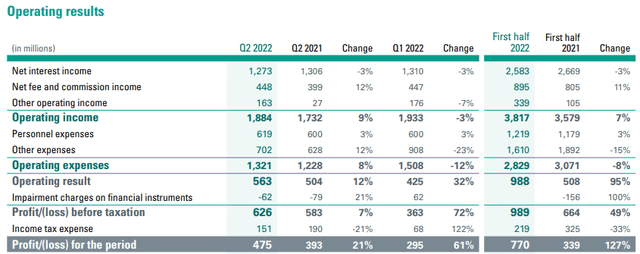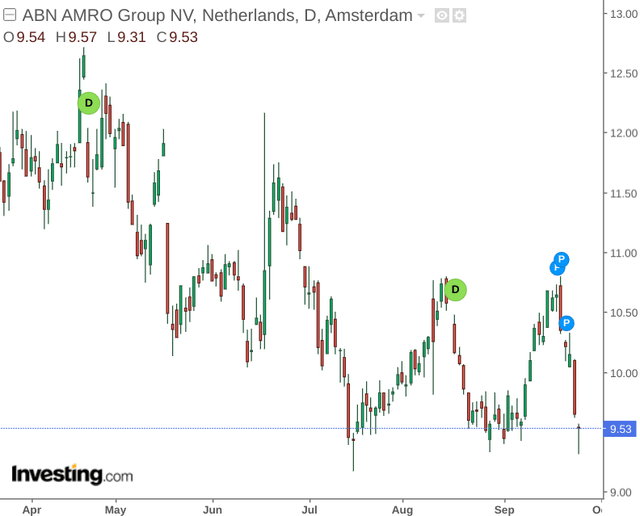TasfotoNL
Investment Thesis: I take the view that ABN AMRO is likely to trade stationary for the next quarter due to uncertainty over residential mortgage demand.
In a previous article back in July, I made the argument that while ABN AMRO (OTCPK:AAVMY) could see higher net interest income on the back of higher rates – a potential decline in residential mortgage demand as a result of such higher rates could be a risk factor.
The stock has seen a decline in the first half of 2022 – trading more or less stationary since July:
The purpose of this article is to assess whether ABN AMRO could see a rebound in upside from here, taking Q2 2022 financial results into account.
Performance
When looking at Q2 2022 operating results, we can see that net interest income has declined slightly from the same quarter in 2021.
ABN AMRO Bank Interim Report & Quarterly Report: Second Quarter Results 2022
With meaningful ECB rate rises to the marginal lending facility not having taken place until the end of July this year – it remains to be seen whether the upcoming quarter will mean a rebound in net interest income as a result of higher rates – or whether this will reduce borrowing propensity on the part of consumers.
That said, it is notable that net interest income was actually down when compared to Q2 2021 – with the bank citing lower mortgage prepayment penalties as well as higher steering costs at Treasury as being factors behind the decline.
ABN AMRO Bank Interim Report & Quarterly Report: Second Quarter Results 2022
Through to June, we can see that residential mortgage demand continued to tick upwards – up by 1.14% between March and June 2022 compared with growth of 0.51% between December 2021 and March 2022.
Moreover, we can also see that total client loans were up by 1.1% in the most recent quarter as compared to an uptick of 0.79% between December 2021 and March 2022.
ABN AMRO Bank Interim Report & Quarterly Report: Second Quarter Results 2022
With that being said, given that residential mortgages accounted for 62% of total client loans in June 2022 – the risk remains that a slowdown in the Dutch housing market could see residential mortgage demand drop.
For instance, the NL Times reports that house prices in the Netherlands showed a slight decline in house prices in August – with home buyers paying an average of 0.1 percent less for a house as compared to July.
However, should the housing market continue to contract in line with broader ECB rate rises – then we could see a situation where residential mortgage demand drops until such time that house prices come down to a level that would justify paying higher mortgage rates.
Looking Forward
ABN AMRO is the market leader in Dutch mortgages, with a market share of 17.5% reported for Q2.
From this standpoint, while the bank would invariably be hit by a slowdown in mortgage demand – I do not envisage a situation where the bank would lose significant business to competitors.
However, with corporate loans to clients being the second largest source of total client loans – the bank could see some risk here if an eventual recession causes companies to cut back on investment and thus reduce loan demand.
With Corporate Banking having accounted for 27% of total client loans in June 2022 – a significant determinant of risk will be the degree to which an anticipated rise in energy prices reduces corporate activity.
Additionally, with ABN AMRO having ended its exposure to the oil and gas industry in the United States due to a sale of a portfolio of energy loans in Q2 2021, investors may consider the opportunity cost of less exposure to U.S. oil and gas firms which are now engaging in greater domestic production as a result of the ongoing situation in Ukraine.
In this regard, investors may instead choose greater exposure to U.S. financial firms that stand to benefit from greater loan demand across companies in the U.S. oil and gas sector.
Conclusion
To conclude, ABN AMRO has seen growth in net interest income and residential mortgages continue to climb. However, the true extent to which inflation and higher energy prices could affect performance is yet to be seen. I take the view that investors will cautiously watch how the residential mortgage market performs in the next quarter before we see a potential rebound in upside.
Additional disclosure: This article is written on an “as is” basis and without warranty. The content represents my opinion only and in no way constitutes professional investment advice. It is the responsibility of the reader to conduct their due diligence and seek investment advice from a licensed professional before making any investment decisions. The author disclaims all liability for any actions taken based on the information contained in this article.



Be the first to comment